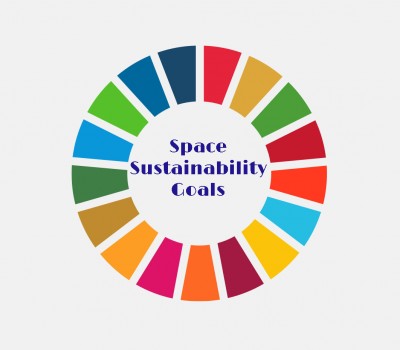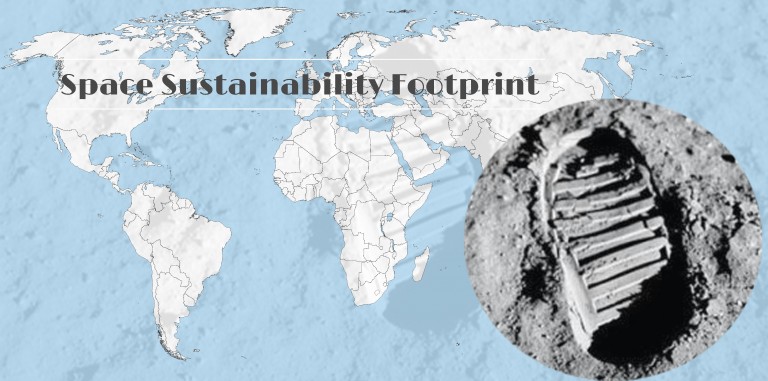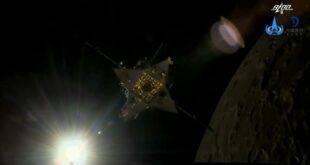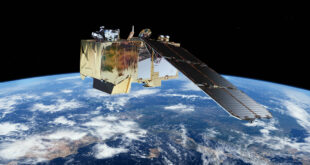As part of the partnership between SpaceWatch.Global and Dr. Olga Stelmakh-Dresher, we have been granted permission to publish selected articles. This is “From Sustainable Development Goals to Space Sustainability Goals″, originally published on 4 August 2019 at spacegeneration.org
Improving the “Space Sustainability” State of the World
“Shared understanding is particularly critical
if we are to shape a collective future
that reflects common objectives and values.”
― Klaus Schwab, The Fourth Industrial Revolution
In diplomatic circles more than ever before we talk about an increasingly congested, contested and competitive nature of a strategic space environment. At the same time the dependence from, and reliance, on space technologies and derived services is growing exponentially. This calls for global solutions to space sustainability challenges that we encounter nowadays and that can endanger safe conduct of space operations in the future.
Over the last years, a lot of attention has been paid to the Sustainable Development Goals (SDGs) and how space technologies could contribute to their achievement. Even though this is of high importance, still even more attention of space actors should be paid to preserving and securing the space environment, making them more responsible for their activities in space, including environmental and ethical concerns that very often are underestimated. To gain global attention, their importance is often translated through economic reasoning. However, the economic component is not the only constituent element of sustainability, but comes along with equally crucial social and environmental elements. Hence, why not implement best practices and impact-driven soft power tools successfully used by diplomacy in other areas, or globally, to attract attention to the issue of space sustainability? Keeping in mind the tremendous outreach success that SDGs had in terms of raising awareness and encouraging to take urgent action to address pressing global challenges, it would be worthwhile to apply this proven practice to the space sector, shaping the space sustainability agenda for the benefit of all, both present and future generations, by defining the Space Sustainability Goals (SSGs) and targets – a globally shared commitment that would drive positive transformative change and empower stakeholder engagement in inclusive, participative and good governance dialogue over responsibly conscious use of outer space. Such Goals should guide and shape a sustainably oriented decision-making without prejudice to achievement of the UN COPUOS Long-Term Sustainability Guidelines that were ignited, designed and negotiated over the last decade and in June 2019 finally consented and adopted.
In the context of the ongoing paradigm change that the space ecosystem is currently facing, the accountability for activities conducted in space should play one of the essential roles. Here, the SSGs could also help — but for this they have to be positioned as a globally integrated response that reflects the not only acknowledgement of problems posed to space sustainability but also closes the gap between ongoing discussions and the way forward. The SSGs could also be seen as indicators and benchmarks for undertaken space sustainability efforts and implemented sustainable practices.
“In all moments of major technological change,
people, companies, and institutions
feel the depth of the change,
but they are often overwhelmed by it,
out of sheer ignorance of its effects.”
― Klaus Schwab, The Fourth Industrial Revolution
One of the most recent and actually game-changing initiatives focused on space sustainability through prism of accountability is the launching of a voluntary Space Sustainability Rating (SSR). Conceptualized within the WEF Global Future Council on Space Technologies and transferred for further development to a by the World Economic Forum selected Consortium, which is led by the Space Enabled Research Group at the MIT Media Lab and a team from the European Space Agency (supported by experts from Bryce Space and Technology and the University of Texas at Austin), the SSR is designed to ensure the long-term sustainability of the space environment. It encourages more responsible behavior among space stakeholders through the elaboration of a questionnaire, an evaluation algorithm and a grading system that would enable weighting critical for space sustainability characteristics and scoring the activities of space actors, particularly their impact on the sustainability of the space environment and efforts undertaken towards the minimization of a potentially caused environmental damage, which would consequently recognize and incentivize sustainably-positive behavior and development of technologies consistent with this purpose. In addition to benefiting the entity’s image and posture within the space sector, a high SSR score might be taken into account when selecting a responsible company to partner with — or even for insurance purposes.
Another action that could add to the capacity-building of space sustainability grounds by demonstrating (illustrating) the divergences observed in different parts of the world and very often within the regions, is to design the Space Sustainability Footprint (SSF). The SSF would be a global map spotlighting relevant practices, initiatives, solutions and legal instruments that exist and are used by space actors around the world. The map should reflect all aspects of space sustainability that fall under the scope of, and are covered within, the domestic governing regime, and particularly visualize where and how (i.e. to which extent and how comprehensively) the space sustainability issues are touched upon nationally, and what their level of enforceability is. The SSF would be incomplete if not supported by background statistics such as the number of space objects launched and operated by each country, operational vs. non-operational objects, and percentage of safely de-orbited / disposed objects among the non-operational ones. Of a special interest is to show the place (if any) allocated directly or indirectly to the issues related to space sustainability in the national licensing process and entities that contributed to space sustainability in an active way (e.g. adjusting designs, developing needed technologies, drafting internal policies and instructions etc.).
If coherently, consciously and globally implemented, these three initiatives (SSGs, SSR and SSF) will lay down a solid “soft power” foundation for sustained positive change in the realm of space sustainability.
Rights reserved – this publication is reproduced with permission. The original was published : https://spacegeneration.org/oped-from-sustainable-development-goals-to-space-sustainability-goals
—
 Bio: Dr. Olga Stelmakh-Drescher is an international space lawyer, NewSpace advocate and space environmentalist – shaper of the Space Sustainability Goals and social responsibility for space activities concepts. She holds the position of Director of Business Development and International Affairs at the International Institute of Space Commerce and is a member of the World Economic Forum Global Future Council on Space Technologies. In addition to this, she is the Assistant Executive Secretary and Head of the Board Election Committee at the International Institute of Space Law.
Bio: Dr. Olga Stelmakh-Drescher is an international space lawyer, NewSpace advocate and space environmentalist – shaper of the Space Sustainability Goals and social responsibility for space activities concepts. She holds the position of Director of Business Development and International Affairs at the International Institute of Space Commerce and is a member of the World Economic Forum Global Future Council on Space Technologies. In addition to this, she is the Assistant Executive Secretary and Head of the Board Election Committee at the International Institute of Space Law.
Dr. Stelmakh-Drescher has an extensive background in space matters, having worked in the space sector for more than 15 years, including seven years of governmental and parliamentarian engagement (European Space Agency, Ukrainian Space Agency, Parliament of Ukraine, and German Aerospace Center). She has become noted as a lawyer with strong business, diplomacy and policy background, working around the globe, combining public service with academic work and legal practice.
She is a frequent speaker at many international space fora (United States, Europe, Middle East and Asia-Pacific), chaired and moderated number of panel discussions. She places a lot of emphasis on leadership, knowledge-based society, inclusiveness and empowerment of the next generation, serves as mentor to many and is an often lecturer on issues of space sustainability and security, NewSpace and global space governance. Dr. Olga publishes extensively on space-related topics.
 SpaceWatch.Global An independent perspective on space
SpaceWatch.Global An independent perspective on space






